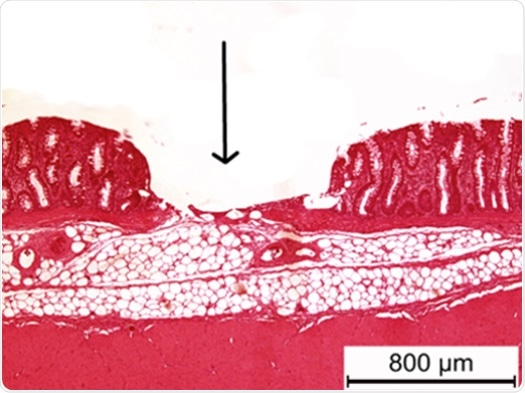Sep 24 2016
A project to develop a revolutionary new bowel cancer surgery tool that will enable surgeons to carry out operations with far greater precision than ever before has received £628,000 in funding. Once developed, the new technology will significantly outperform conventional, electric-based tools that are currently being used in bowel surgery.

Heriot-Watt Precisely controlled removal of colonic tissue using picosecond laser with minimal damage to surrounding regions SML
Heriot-Watt University and a consortium of academic and industry organisations received the three-year grant from the Engineering and Physical Sciences Research Council (EPSRC) through the Healthcare Impact Partnership scheme.
The aim of the grant is to allow the team to develop a working prototype of a device that combines optical fibres, which have a diameter similar to that of a human hair, with laser technology and a new optical imaging agent (EMI-137) that detects and images cancerous cells within the bowel.
Each year, 40,000 people are diagnosed with colorectal cancer, which carries a life-time risk of 1:16 for men and 1:18 for women. At present, surgeons are hindered by a lack of access and visibility in the complex folds within the bowel, and which can lead to damage to surrounding tissue and create serious complications such as bowel perforation during an operation.
Currently, the most commonly used surgical method is electro-cautery which uses an electric current to essentially heat the tissue. This is much less precise than the latest technology being developed because it will be highly flexible and open up new routes for minimally invasive surgery, overcoming many of the risks typically associated with electro-cautery.
In order to exploit these technological and clinical advances, the consortium has established a Healthcare Partnership. The ability to realise the full potential of these flexible fibres, and create a novel steerable surgical tool guided by fluorescent optical imaging agents, is only possible by bringing together a unique combination of expertise. This highlights the support of such a focussed EPSRC funding scheme, which is critical in the development of new, life-saving, surgical technologies.
The consortium, led by Dr Jon Shephard of Heriot-Watt University, an expert in the use of lasers in medicine, includes Edinburgh Molecular Imaging Ltd, experts in the discovery and development of optical imaging agents, with clinical expertise provided by Professor David Jayne from the NIHR Healthcare Technologies Co-operative based at the University of Leeds.
Commenting on the development Dr Jon Shephard said:
In its present state, the surgical tools and medical technology available to perform bowel cancer operations make it hard for physicians to navigate around the organ and identify tumours. This EPSRC funding will allow us to create a steerable surgical tool guided by fluorescent molecular probes, improving the likelihood patients will be treated successfully and minimising the risks of the operation.
We have formed an excellent partnership working across the project, including experts in high-power laser applications, surgical technologies and molecular imaging. I am confident that we will be able to further develop the technology and improve the life-saving colorectal surgical procedure, which in turn will become transferable to other life-threatening conditions.
The EPSRC grant runs until 31st July 2019.
Source: https://www.hw.ac.uk/